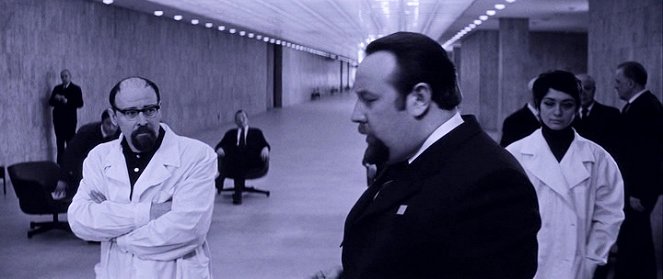Directed by:
Andrei Arsenyevich TarkovskyScreenplay:
Andrei Arsenyevich TarkovskyCinematography:
Vadim YusovComposer:
Eduard ArtemyevCast:
Nataliya Bondarchuk, Донатас Банионис, Jüri Järvet, Anatoly Solonitsyn, Nikolay Grinko, Vladislav Dvorzhetsky, Raimundas Banionis, Bagrat Oganesyan (more)VOD (3)
Plots(1)
Ground control has been receiving strange transmissions from the remaining residents of the Solaris space station. When cosmonaut and psychologist Kris Kelvin is sent to investigate, he experiences the strange phenomena that afflict the Solaris crew, sending him on a voyage into the darkest recesses of his own consciousness. In Solaris, the legendary Russian filmmaker Andrei Tarkovsky gives us a brilliantly original science-fiction epic that challenges our conceptions about love, truth, and humanity itself. (Criterion)
(more)Reviews (8)
The more times I see it, the more I love it. Maybe the runtime is excessive, maybe some of the scenes don't make sense (and yet they still feel magical, for example the drive down the highway), but everything else – especially the atmosphere, the visual compositions hand in hand with the haunting music, the interesting philosophical musings, etc. – all make Tarkovsky's film one of my most magical cinematic experiences in years. This is the kind of uncompromising artistic statement you hardly see anymore in modern cinema.
()
The Tarkovsky scarecrow may not be such a major problem if we view Solaris through the lens of contemporary science fiction. The result will, unfortunately (or thankfully), be just another film that has not withstood the ravages of time. Of course, you can also read Lem's novel, watch the modern remake and, with a slightly ironic smile, look for the old TV version. All science fiction before Star Wars has its limits, including Tarkovsky's opus. I really don't appreciate a spaceship whose integral part is the icons of Andrei Rublev spread out in the cabins. I really, really don’t.
()
Technically brilliant and incredibly profound. Sometimes even unattainable. Tarkovsky is very demanding on the viewer in his abstraction and does not make it easier for them even for a second with his long-winded visions in his sphere of philosophy. However, all inaccessibility is beautifully erased by the simple central theme of the conflict between the most desperate emotion and the cold, meaningless scientific research. And most importantly, I guarantee that if you let yourself be absorbed, you will not understand most scenes due to their ambiguity off the top of your head.
()
I decided to watch this film hoping for an extraordinary experience, which is what I ended up getting. I was so unexpectedly and massively disappointed that it can’t be called anything but an extraordinary experience. The main theme was not bad at all, but the creators unfortunately managed to stretch out the length far beyond what I could possibly bear. At least half of the film is filled with protracted shots of the countryside (or traffic - the taxi ride seemed endless, and it was completely unnecessary, but probably highly artistic), and staying focused felt like a superhuman feat. Good thing it wasn’t me but my replica who had to suffer through it.
()
Equally difficult to grasp as "2001: A Space Odyssey," but equally interpretive, possibly even stronger. Tarkovsky's film does not rely on visual spectacle, but instead the Russian creator opted for philosophical sci-fi, where everything important unfolds through dialogue, memories, not necessarily through images. There are scenes from inside spaceships, but it remains very limited. Even so, this is how sci-fi can be filmed, mainly because the narrative is no less powerful.
()
Gallery (42)
Photo © Mosfilm


Ads